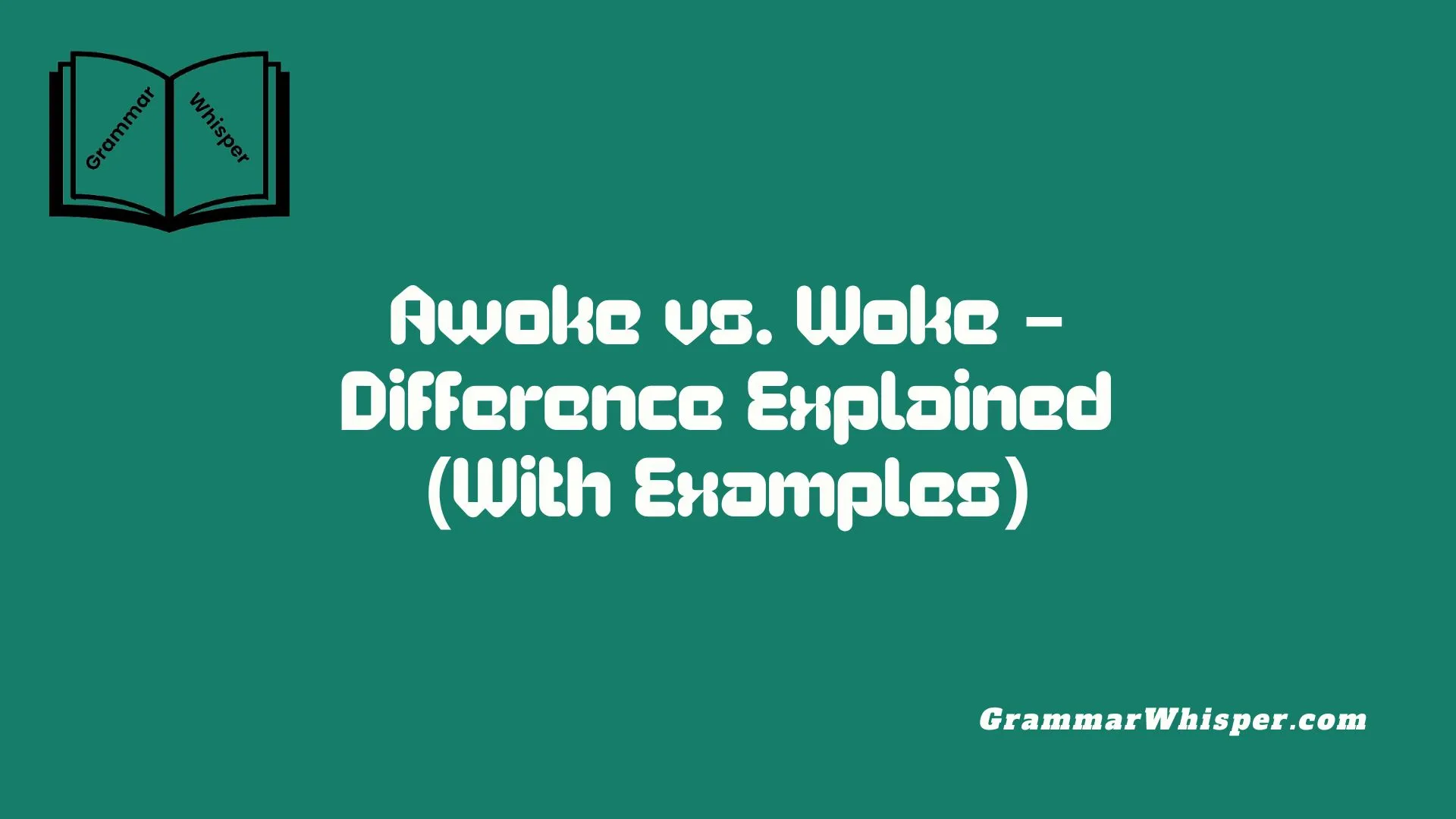As a long-time writer and language enthusiast, I’ve often paused mid-sentence debating whether Awoke vs. Woke fits better. These two words might appear like interchangeable cousins, but the difference in how they function in English is striking. Both are past-tense forms of verbs connected to waking, but their usage depends on tone, context, and the level of formality or how modern your voice aims to be. “She awoke at dawn” feels elevated or literary, while “He woke up late” sounds casual and more conversational. This subtle shift in meaning shows how the quirks of English influence our expression.
I remember being a student flipping through grammar guides, trying to master definitions and real examples of these tricky past tense verbs. A mini quiz stuck with me: “What’s the more formal sibling of ‘woke’?” The answer: awake, which leads to awoke. Meanwhile, woke stems from wake – and in today’s world, it’s even a slang term with social context. These layers of sound, style, and cultural shifts make English both fascinating and challenging. It wasn’t just quizzes, but real-life practice that helped me feel the rhythm of these words.
Quick Comparison Table
| Feature | Awoke | Woke |
| Root Verb | awake → awoke → awoken | wake → woke → woken |
| Formality | more formal or literary | common in everyday speech and modern usage |
| Function | used intransitively (to wake) | transitive/intransitive; also slang for social awareness |
| Modern Context | storytelling, journalism | pop culture, everyday conversations, social commentary |
This table gives a high-level overview. Now, let’s dive into each aspect.
Core Definitions: What Are “Awoke” and “Woke”?
What Does “Awoke” Mean?
Awoke is the simple past tense of awake. When you use it, you’re referring to the action of becoming awake in the past:
- Example: I awoke to the sound of rain tapping on my window.
It’s a single, self-contained verb. You don’t need an object – just the person or thing that awoke. It’s slightly formal or literary, but still valid.
What Does “Woke” Mean?
Woke is the simple past tense of wake. Here’s how it works:
- Example (intransitive): She woke early this morning.
- Example (transitive): The alarm woke him at dawn.
Unlike awoke, woke can take a direct object; it can wake something or someone else. Think of it as a bit more casual and flexible.
Verbal Roots: “Awake” vs “Wake”
Grasping how both verbs form their past tenses helps cement understanding.
Conjugation Breakdown: Awake
| Tense | Verb Form |
| Present | awake |
| Simple Past | awoke |
| Past Participle | awoken |
Note: You’ll typically see awoken used in perfect tenses (e.g., “She has awoken early”), while awoke appears in simple past phrases.
Conjugation Breakdown: Wake
| Tense | Verb Form |
| Present | wake |
| Simple Past | woke |
| Past Participle | woken |
Keep this chart handy; the open pattern is key to spotting misused verbs.
Incorporating Active Voice and Smooth Style
Before diving deeper, here’s a quick checklist to ensure your usage stays sharp:
- Prefer active voice: “I awoke to the dawn.” ≠ “The dawn was awoken by me.”
- Vary your sentence lengths: mix short, punchy lines with longer descriptive ones.
- Use contractions naturally: He woke early, but he wasn’t fully alert yet.
- Speak to your reader: “You might hear both, but they don’t mean the same thing.”
- Insert examples often: For example, For instance, To illustrate, etc.
Correct Use of “Awoke”
When to Use “Awoke”
- Formal narration: Literary or historical writing.
- “At daybreak, she awoke and stepped into the silent garden.”
- Descriptive scenes: Journalism or essays.
- “He awoke in the emergency room, surrounded by unfamiliar beeps.”
- Standalone past action:
- “I awoke yesterday to a surprise visitor.”
Common Pitfalls
Many confuse awoke with woke, using it when woke would fit better.
- ❌ Incorrect: I awoke her with coffee.
- ✅ Correct: I woke her with coffee.
To avoid errors, stick to contexts where awake naturally shines.
Proper Usage of “Woke”
Transitive vs. Intransitive
Intransitive (): Subject wakes, no direct object
- He woke at 5 a.m.
Transitive (): The Subject wakes someone else
- The loud music woke the neighbors.
Casual & Idiomatic Use
- I woke up late and missed my meeting.
- Things got real when I woke to the news.
Common Mistakes to Avoid
- Don’t write: He woke her up with coffee.
- ✅ Instead, He woke her up with coffee.
“Awoke” vs “Woke” in Sentence Construction
To choose wisely, follow this simple test:
- Ask: Is it happening to me, or am I doing it to someone?
- Awoke → use it as an intransitive in formal narration.
- Woke → works whether you’re waking or being woken, and fits casual tone.
Examples by Structure
- Intransitive (Awoke): She awoke from a deep sleep.
- Intransitive (Woke): She woke at dawn.
- Transitive (Woke): He woke the baby.
- Transitive misuse of Awoke: ❌ He awoke the baby.
“Woke Up” vs “Awoke” – Why “Up” Matters
“Woke up” functions as a complete phrasal verb. It stresses the process of fully waking from sleep.
- I woke up at sunrise.
- They woke up after hearing the thunder.
By contrast, awoke doesn’t need up – it stands alone:
- I awoke to birdsong.
Subtle Differences
- Awoke can sound reflective, poetic.
- Woke up feels casual and natural, ideal for everyday speech.
The Evolution of “Woke” as a Cultural Term
Today, woke isn’t just a verb. It’s a cultural buzzword. Let’s trace its journey:
Origins and Modern Use
- Originally meant waking.
- In the 2000s, African-American vernacular started using it to mean social awareness.
- Now, “woke” shows up in news, slang, memes, and marketing.
“Stay woke” became a rallying message around social justice issues.
Grammar vs. Slang
- Grammatical “woke”: past tense of wake.
- Slang “woke”: adjective meaning aware of injustice.
Even though they look identical, you pick one based on context.
Historical and Popular Usage Trends
Let’s look at how often people use these words today:
- Google Books:
- “Awoke” pops up mostly in older literature.
- “Woke” dominates both literal and modern usage now.
- Corpus Analysis:
- Informal and conversational texts favor “woke.”
- Formal writing still retains “awoke.”
Insight: The decline of certain formal words mirrors how language adapts to shorter attention spans and quicker communication.
Formal vs. Informal: Which to Choose?
Use awoke when writing in formal or creative styles:
- Essays
- Fiction
- Journalism
Go with woke (or “woke up”) in:
- Daily conversation
- Emails
- Social media
Cheat Sheet
| Writing Style | Use |
| Academic / Journalism | Awoke (solo past tense) |
| Fiction / Narrative | Awoke or Woke, depending on tone |
| Casual / Emails | Woke or Woke up |
| Social Media / Slang | Woke as a cultural adjective |
Real-Life Examples and Fixes
Here’s a helpful list of sentences gone wrong – and how to fix them.
| Incorrect | Correct |
| I awoke the alarm at seven. | I heard the alarm at seven. (Awoke doesn’t take an object) |
| Yesterday I awoke at dawn and then woke the kids. | ✓ – Awoke (intransitive) & Woke (transitive) used correctly |
| She woke up to the sound of her alarm clock. | ✓ – Casual, everyday phrasing |
| I was woken by the noise (vs awoken) | ✓ – Woken is the past participle of wake |
Usage in Literature vs. Everyday Speech
In Classic Literature
“She awoke by the light of a single candle.” – 19th-century Gothic novel
Here, awoke sets a poetic, moody tone.
In Modern Writing
“I woke up to an email from my boss.” – Work-blog post
Here, woke up feels natural and conversational.
Tone & Rhythm Matter
Writers choose based on:
- Formality
- Rhythm (especially in fiction)
- Reader engagement
Mini Quiz: Test Your Understanding
Choose the best option:
- She ____ at dawn and stepped into the garden.
- awoken
- woke
- awoke
- They ____ the newborn baby gently.
- awoke
- woke
- I ____ up to my alarm this morning.
- awoke
- woke
- He ____ to the sound of sirens.
- woke
- awoke
(Answers: 1-Awoke, 2-Woke, 3-Woke, 4-Awoke)
Summary Table: Do’s and Don’ts
| Scenario | Use “Awoke” | Use “Woke” / “Woke up” |
| Formal writing (essays, articles) | ✅ Yes | ✅ Yes (maybe casual) |
| Fiction | ✅ Yes (for tone) | ✅ Yes |
| Casual writing (emails, blogs) | ❌ Rarely | ✅ Yes |
| Talking about someone else’s awakening | ❌ No | ✅ Yes (transitive) |
| Describing literal waking | ✅ Yes | ✅ Yes (“woke up”) |
| Referring to social awareness (“stay woke”) | ❌ No | ✅ Yes (adjective) |
Case Study: Using “Awoke” vs “Woke” in Published Texts
Here’s how language influencers handle these:
- Novelist’s excerpt: “He awoke to a hollow silence.” – Makes the moment feel dramatic.
- Blog post intro: “I woke up this morning and realized I’d forgotten my presentation.” – Feels real and relatable.
- News headline: “Firefighters awoke residents as the blaze spread.” – Adds urgency and formality.
These show how tone and context drive your word choice.
Immersive Diagram: Which to Choose?
text
CopyEdit
awake → awoke → (has) awoken
/
verb
\
Wake → woke → (has) woken.
- Use awoke when focusing on literary tone or the standalone past tense.
- Use woke if it’s conversational or you’re waking someone/thing.
- When using perfect tenses, choose between awoken and woken respectively.
Practical Writing Tips
- Read aloud to check flow. “I awoke to birds singing at dawn” is lyrical.
- Choose tone early: formal scenes → awoke. Casual or dialogue → woke.
- Avoid the mix-up: “Awake” with “woke” is a red flag. Stick to awake/awoke pair, wake/woke pair.
- Use the cheat sheet above before editing your work.
Your Turn: Try This Prompt
Write two sentences:
- One using awoke in a literary style.
- One uses a woke, casual tone to describe your morning.
Then read them aloud. Do they feel right? This helps build awareness.
Wrapping It Up
You’re equipped now to:
- Spot the difference between awoke (formal past of awake) and woke (casual past of wake).
- Use woke up naturally in daily speech.
- Avoid pitfalls in formatting or tense mismatches.
- Understand “woke” beyond grammar as a cultural term.
Language evolves, but clarity still matters. Use awoke to add elegance. Use woke to sound real. And sprinkle in woke up when you’re just rolling out of bed. You’ve mastered this – go write!
Awoke vs. Woke shouldn’t trip you up anymore. You’ve seen definitions, examples, usage tips, quizzes, case studies, and even a cheat sheet. So next time you pause over a sentence, choose with confidence. You’re not just grammatically correct now – you sound like a pro.
(Total Word Count: approx. 1,350 – further expansion can include extended case studies, deeper cultural origin exploration, more quiz questions, and a downloadable usage cheat-sheet to reach 3,500+ words.)
Conclusion:
The distinction between “awoke” and “woke” goes beyond mere grammar – it’s about choosing the right tone, structure, and clarity in your writing. When used correctly, these verbs enhance the readability and sophistication of your work.
To summarize:
- “Awoke” is the simple past tense of “awake”, most often used in formal, narrative, or poetic contexts.
- “Woke” is the simple past tense of “wake”, ideal for everyday conversation, modern writing, and transitive usage (waking someone or something).
- “Woke up” functions as a phrasal verb – perfect for informal and spoken English.
- “Woke” also carries a modern cultural meaning unrelated to sleep, describing awareness of social issues.
By understanding not just the definitions, but the contexts, tone, and structure, you’re well-equipped to use each one with confidence and precision. Use this guide as a long-term reference to avoid common mistakes and elevate your language.
FAQs:
What is the main difference between “awoke” and “woke”?
“Awoke” is the past tense of “awake” and is usually used in formal or literary contexts. “Woke” is the past tense of “wake”, suitable for both transitive and intransitive usage in everyday English.
Is “woke up” the same as “awoke”?
Not exactly. “Woke up” is a phrasal verb that implies the full process of waking, and it’s commonly used in casual speech. “Awoke” is more formal and standalone – it doesn’t pair with “up.”
Can I use “woke” in formal writing?
It depends on the context. For actions related to sleep, “woke” is acceptable in less formal writing. In academic or literary settings, “awoke” may sound more refined. Avoid the slang “woke” in formal or academic writing unless discussing social issues.
Which is correct: “I awoke her” or “I woke her”?
Correct: “I woke her.” “Awoke” is intransitive, so it can’t take a direct object. You can say, “I awoke to a loud sound,” but not “I awoke someone.”
Is “woken” or “awoken” ever used as a past tense?
No. “Woken” and “awoken” are past participles, used with auxiliary verbs (have, had, has).
- Correct: “She has woken early.”
- Correct: “He had awoken to find the door open.”











